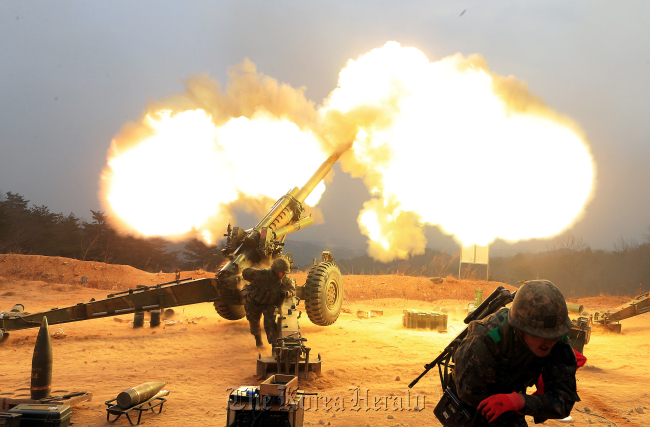The two Koreas traded fire on Thursday after the North launched a rocket apparently targeting loudspeakers installed across the border for propaganda broadcasts, prompting the South to shoot back “dozens” of artillery shells.
The North’s rocket was fired at around 3:52 p.m. at the equipment put up in Yeoncheon County, Gyeonggi Province. Shortly after detection, the Army discharged dozens of 155-millimeter shells at its perceived origin at around 5 p.m., Seoul’s Defense Ministry said.
The rocket appeared to have hit an uninhabited hill in the vicinity.
The Army reported no damage. Casualties in the North were not immediately known.
 |
|
This undated image shows South Korean soldiers conducting live fire drills. (Yonhap) |
The military was put on its highest readiness while releasing an evacuation order for some residents of Yeoncheon, Paju, Ganghwado Island and other border areas.
President Park Geun-hye convened an emergency meeting of the presidential National Security Council to examine the incident and formulate follow-up steps.
“We’re conducting an in-depth analysis on the rocket’s trajectory and will come up with countermeasures. We suffered no damage,” a Joint Chief of Staff official told The Korea Herald.
“The military has strengthened its security posture and is closely watching the North Korean military’s movement,” the ministry said in a statement.
Last week, the South Korean military restarted the broadcasts in the Demilitarized Zone, closing an 11-year hiatus, after the JCS found that the North was behind the Aug. 4 explosion of land mines that inflicted serious wounds on two soldiers.
Flatly denying its responsibility, the North Korean military urged a pullout of the loudspeakers in its “public warning” last Saturday, threatening “indiscriminate strikes” if its demand does not materialize.
The North, for its part, has resumed its own propaganda program in the area and tightened vigilance against the South.
The Rodong Sinmun, the North’s ruling Workers’ Party’s mouthpiece, called the border broadcasts and anti-Pyongyang leaflet sprayings a “prelude to war” and “most explicit plot for psychological warfare.”
Pyongyang has also been churning out military threats against the ongoing Ulchi Freedom Guardian, a major annual drill by South Korea and the U.S.
“This year’s UFG exercise implies a stringency that cannot be overlooked in light of various unusual signs that have recently emerged around the Military Demarcation Line,” the paper said Tuesday.
Yet tension is set to flare up across the border as Defense Minister Han Min-koo vowed to expand the broadcasts “to full scale.” During a parliamentary session last week, he said that the program was airing in four spots, and anti-Pyongyang leaflets and propaganda electronic boards are other options being considered as next retaliatory steps.
The minister has also raised the possibility for another major provocation timed for the anniversary of the founding of the Workers’ Party in October.
The loudspeakers were taken down in 2004 as a result of inter-Korean military dialogue. They were reinstalled at 11 places along the MDL following the North’s 2010 fatal attack on the corvette Cheonan, which led Pyongyang to threaten to shoot them down, but had since been idle.
With the absolute majority of North Koreans remaining isolated from the outside world, the broadcasts have proved to be a rare source for news of the execution and purge of elite military executives and other power struggles within the top echelons, information about free democracy and other regional and global issues, along with weather forecasts and music. Many defectors resettled in the South have testified that they had come to hear first about the South through the broadcasts, which can travel as far as 10 kilometers.
By Shin Hyon-hee (heeshin@heraldcorp.com)
(연합)

